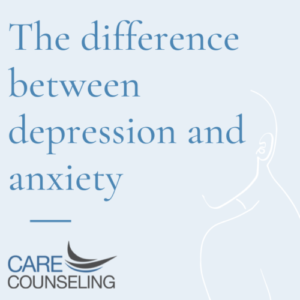 While there is some similarity between anxiety and depression, as they are both mood disorders with the possible overlap of several symptoms there are also distinct differences. It can be hard to know if you have depression or anxiety.
While there is some similarity between anxiety and depression, as they are both mood disorders with the possible overlap of several symptoms there are also distinct differences. It can be hard to know if you have depression or anxiety.
One of the most significant differences is in the core features. One of the core features of anxiety disorders includes excessive worries and fears; whereas core features of depression include feelings of sadness, depressed mood, and/ or decreased interest and pleasure. Symptoms can be situational, sub-clinical, or meeting the full criteria for a specific anxiety or depressive diagnosis.
Did you know that anxiety disorders are the most common and depression is also very common?
Anxiety-related disorders include generalized anxiety, social anxiety, panic disorder, and phobias. Types of depression include major depression, persistent depression (dysthymia), bipolar disorder, postpartum-depression, (peripartum depression), and seasonal affective disorder.
For individuals who struggle with depression, interest in activities that were once enjoyable is impacted by mood. Fatigue, decreased motivation, and feelings of hopelessness can make things like the completion of household tasks, going to work or school, and socializing difficult. Additional symptoms can include changes in appetite (eating more or less), changes in sleep (sleeping more or less), and feeling bad about self, including a feeling of failure, suicidal thoughts, and difficulties concentrating.
Individuals with anxiety may have many worries in a variety of “everyday” life events such as work or school, relationships, finances, and health. Associated symptoms can include difficulties sleeping and concentrating, fatigue, irritability, and muscle tension. Anxiety often feels overwhelming, as if one is losing control. Irritability and attempts to regain control may be present.
Some people with anxiety have very specific worries or fears. Intense surges or fear along with intense discomfort are experienced in the body by a variety of symptoms characteristic of panic such as sweating, shaking, trembling, dizziness, shortness of breath, choking, nausea, and accelerated heart rate. Panic attacks can be present with a variety of anxiety-related disorders.
A common response to feeling overwhelmed is avoidance. Unfortunately, this only contributes to depression and can heighten anxiety distress. For those who experience anxiety disorders, there is often anxious distress and avoidance in feared situations. For example avoidance of crowded spaces and public transportation is common in those with agoraphobia, avoidance of separating from a parent, caretaker, or major attachment figure in those with separation anxiety, and avoidance or enduring social situations with intense anxiety in social anxiety.
Negative and repetitive thought patterns are also present in both anxiety and depression in the form cognitive-distortions. Some people may have symptoms of anxiety that coincide with the onset of depression while in others these may be separate concerns. It is estimated that the likelihood of having both depression and anxiety at the same time is about 60%.
Both anxiety and depression can be treated with psychotherapy “talk therapy” which can be an effective treatment to help process stressors, manage symptoms, and maintain optimal mental health functioning. Cognitive behavioral therapy (CBT) is considered the most effective form of psychotherapy specifically for mood disorders such as anxiety and depression. Therapy helps work with anxious and/ or depressive thoughts, feelings, and behavioral patterns. Medication can also provide relief from symptoms and can be especially effective when combined with psychotherapy and your personal goals for healthy lifestyle habits.
Written By: Charlotte Johnson, MA, LPCC
We’re Here to help
Our wellness experts will be happy to take care of you. You can CLICK HERE to schedule an appointment now or call (612)223-8898.
Meet Clinicians
We’re united by our commitment to providing effective, relevant, and innovative mental health support at all stages of your journey. Click Here to find a therapist or find out more about who we are, where we come from, and how we live out CARE’s mission every day.
The professionals at CARE are actively collecting and creating resources to help with what you need and address frequently asked questions. We’re Here for You.



